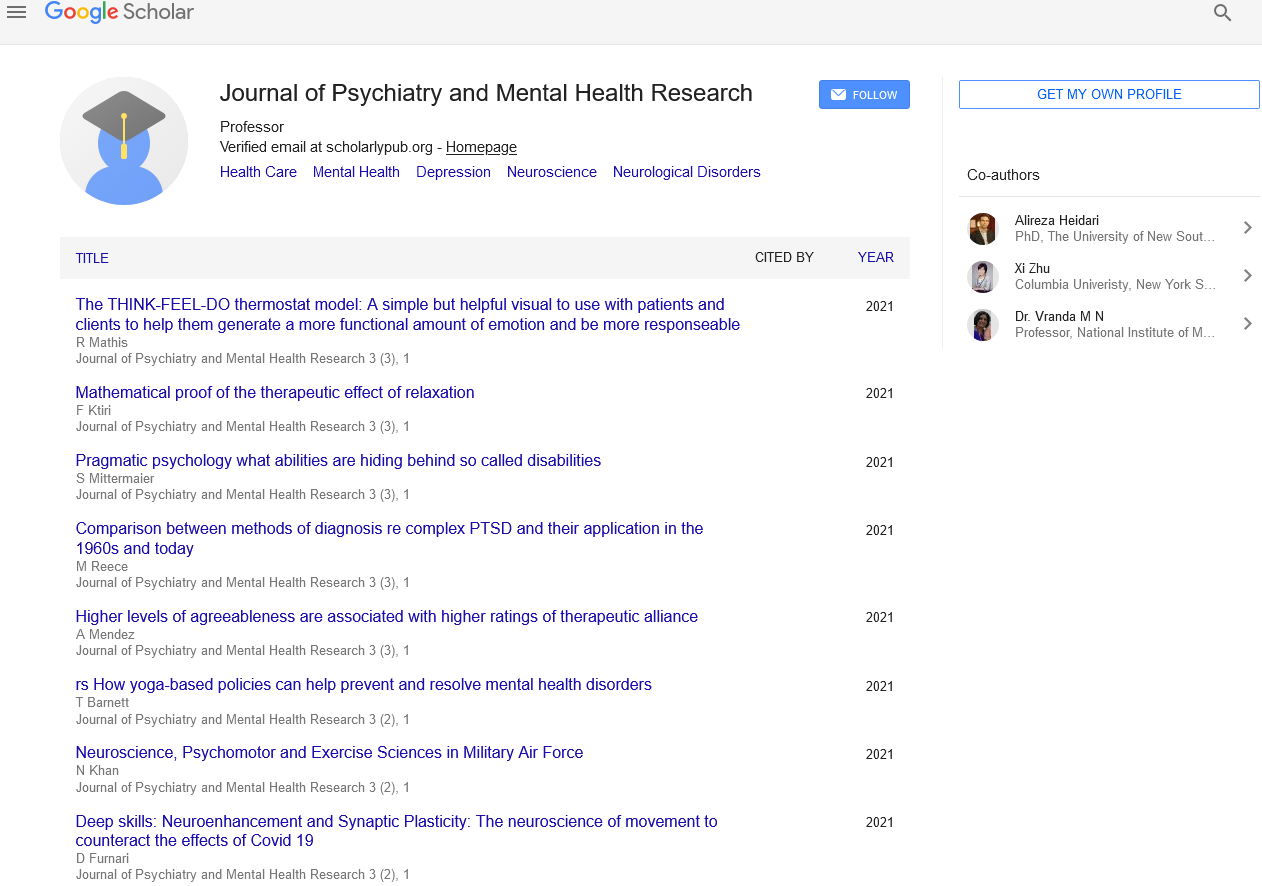Addiction Psychiatry: Understanding, Diagnosis, and Treatment Approaches in the Management of Substance Use Disorders
Received: 29-Mar-2024, Manuscript No. pulpmhr-25-7386; Editor assigned: 02-Apr-2024, Pre QC No. pulpmhr-25-7386(PQ); Accepted Date: Apr 29, 2024; Reviewed: 15-Apr-2024 QC No. pulpmhr-25-7386(Q); Revised: 26-Apr-2024, Manuscript No. pulpmhr-25-7386(R); Published: 30-Apr-2024
This open-access article is distributed under the terms of the Creative Commons Attribution Non-Commercial License (CC BY-NC) (http://creativecommons.org/licenses/by-nc/4.0/), which permits reuse, distribution and reproduction of the article, provided that the original work is properly cited and the reuse is restricted to noncommercial purposes. For commercial reuse, contact reprints@pulsus.com
Abstract
Addiction psychiatry is a specialized branch of psychiatry focused on the prevention, diagnosis, and treatment of Substance Use Disorders (SUDs). With the rising global prevalence of addiction to substances such as alcohol, opioids, and stimulants, the need for specialized psychiatric care has never been more urgent. This article provides an overview of addiction psychiatry, exploring the pathophysiology,diagnostic criteria, and treatment modalities for substance use disorders. The discussion covers pharmacological interventions, psychotherapy, and integrated treatment approaches, emphasizing the importance of a holistic, individualized care plan. Additionally, the article highlights the challenges in treating addiction, including stigma, co-occurring mental health conditions, and access to care, while suggesting future directions for advancing addiction psychiatry.
Key Words
Addiction psychiatry; Substance use disorder; Addiction treatment; Pharmacological intervention; Psychotherapy; co-Occurring mental health disorders; Addiction recovery; Integrated care; Stigma
Introduction
Addiction psychiatry is a specialized field within psychiatry that focuses on the treatment of individuals suffering from substance use disorders (SUDs). SUDs, including addiction to alcohol, opioids, stimulants, and other substances, have a profound impact on physical, psychological, and social well-being. Addiction is often seen as a chronic, relapsing condition that requires long-term management and specialized care. Effective addiction psychiatry integrates medical, psychological, and social approaches to help individuals regain control over their lives. This article delves into the essential components of addiction psychiatry, highlighting current treatment strategies and future advancements in the field.
Addiction is a complex and multifactorial disorder involving biological, psychological, and environmental factors. From a neurobiological perspective, addiction is often described as a dysfunction in the brain’s reward system, particularly in areas such as the nucleus accumbens, prefrontal cortex, and ventral tegmental area. The release of neurotransmitters like dopamine in response to substance use creates pleasurable feelings, reinforcing the behavior and leading to repeated use. Over time, tolerance and dependence develop, leading individuals to increase their substance use to achieve the same effect. Understanding these neurological processes is crucial for developing effective treatments, as it enables clinicians to address both the biological and behavioral components of addiction. Accurate diagnosis is critical for effective addiction treatment. The Diagnostic and Statistical Manual of Mental Disorders (DSM-5) outlines criteria for diagnosing substance use disorders, which include a range of symptoms such as cravings, loss of control over substance use, and continued use despite negative consequences. Comprehensive assessments typically include a detailed clinical interview, psychological evaluation, and screenings for co-occurring mental health disorders. These evaluations help clinicians determine the severity of the disorder, identify any underlying conditions, and tailor treatment plans accordingly. Pharmacotherapy plays an important role in addiction management. Medications are used to reduce cravings, prevent relapse, and manage withdrawal symptoms. These medications, when combined with other therapeutic interventions, can significantly improve treatment outcomes. However, pharmacological treatments are most effective when integrated into a comprehensive care plan that includes psychological support and social services. Psychotherapy is another cornerstone of addiction treatment. Cognitive-behavioral therapy (CBT) is one of the most widely used forms of psychotherapy in addiction psychiatry. CBT helps individuals identify and change negative thought patterns and behaviors associated with substance use. Other therapeutic approaches include contingency management, which rewards positive behaviors, and motivational interviewing, which enhances an individual’s motivation to change. Family therapy and group therapy also play important roles in providing social support and improving communication skills, which are essential for long-term recovery.
Challenges and Opportunities
Several challenges complicate the effective treatment of addiction. One of the primary obstacles is the stigma surrounding addiction, which can prevent individuals from seeking help and accessing appropriate care. Many people with substance use disorders face societal judgment, leading to feelings of shame and isolation. Overcoming this stigma through education, awareness, and compassionate care is essential for improving access to treatment. Another challenge is the availability of resources, particularly in underserved areas, where there may be a shortage of addiction specialists or treatment facilities. Additionally, addressing the social determinants of health, such as poverty, unemployment, and trauma, is critical in supporting recovery. The future of addiction psychiatry lies in continued research and innovation. Advances in neurobiology, genetics, and pharmacogenomics hold promise for developing more targeted treatments tailored to an individual’s genetic profile. Additionally, telemedicine and digital health technologies are becoming increasingly important in providing accessible care, particularly in rural or remote areas. Expanding access to evidencebased treatments and integrating addiction care into primary healthcare settings will help reduce the burden of addiction on individuals and communities.
Conclusion
Addiction psychiatry plays a vital role in the treatment and management of substance use disorders, offering a multifaceted approach that combines medical, psychological, and social interventions. While significant progress has been made in the understanding and treatment of addiction, challenges such as stigma, co-occurring mental health conditions, and access to care remain prevalent. Effective addiction treatment requires a holistic, individualized approach that integrates pharmacological therapies, psychotherapy, and support systems. As the field continues to evolve, the future of addiction psychiatry will be shaped by advancements in personalized care, innovative treatments, and broader access to mental health services. By addressing the root causes of addiction and providing comprehensive care, addiction psychiatry can significantly improve the lives of individuals and contribute to the reduction of substance-related harm in society.





